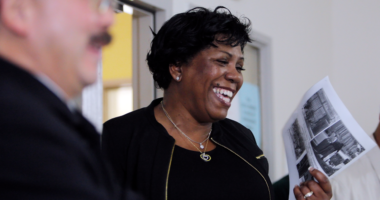Share this @internewscast.com

Could a woman with gonads play the flute better? Would a man with fallopian tubes excel at playing the organ? These questions might be explored in an upcoming college course.
In case you’re unfamiliar with private university The New School, here’s a bit of info from its site:
Since our inception in 1919, The New School has been redefining the limits of intellectual and creative thinking as a leading academic institution. Our comprehensive, interdisciplinary educational model is designed to foster forward-thinking minds.
Inclusivity is key:
Our legacy of commitment to creating a more equitable, inclusive, and socially just environment continues to drive our mission…
The institution promotes itself as a hub that “reimagines the future,” where “academics, designers, artists, and innovators converge in [New York City] to boldly question tradition and drive positive change.”
Speaking of trumpets — or, apropos of horny pursuits — this fall will see the school dive into underwear, instruments, and arrangement. Via an arts class, music will merge with modernity.
Burning question, prepare for a put-out:
LMUS 2035: Why Do Trans Women Make Awesome Music?
“Why do trans women make awesome music?!” So begins a recent Reddit thread. This course posits that part of what makes trans women’s music “awesome” are the lyrics and sounds of their political demands in transmisogynistic cultures determined to silence them. To explore this question further, we will consider how music expresses transfeminist politics of race, class, gender, and sexuality in the post-“Trans Tipping Point” era of today.
The investigation — rewarding enrollees with four college credits — will feature work from some of the XY-chromosome’d transgender genre’s juggernauts. They are women; hear them resplendently roar:
With a mixtape of songs by Ms. Boogie, Transcendence Gospel Choir, Arca, Susy Shock, SOPHIE, Ah-Mer-Ah-Su, Anohni, and more, we will explore how contemporary trans musicians have used music to amplify transfeminist politics as a soundscape that transmisogyny cannot drown out.
The exploration is heartily at home with academia’s overarching embrace. Sexual politics are out and proud, while gender identity enjoys a jubilee:
There’s a sense to the shift, considering an unprecedented portion of college students are soaking in rainbow rays. Per Gallup:
[E]ach younger generation is about twice as likely as the generation that preceded it to identify as LGBTQ+. More than one in five Gen Z adults, ranging in age from 18 to 26 in 2023, identify as LGBTQ+, as do nearly one in 10 millennials (aged 27 to 42). The percentage drops to less than five percent of Generation X, two percent of baby boomers and one percent of the Silent Generation.
















